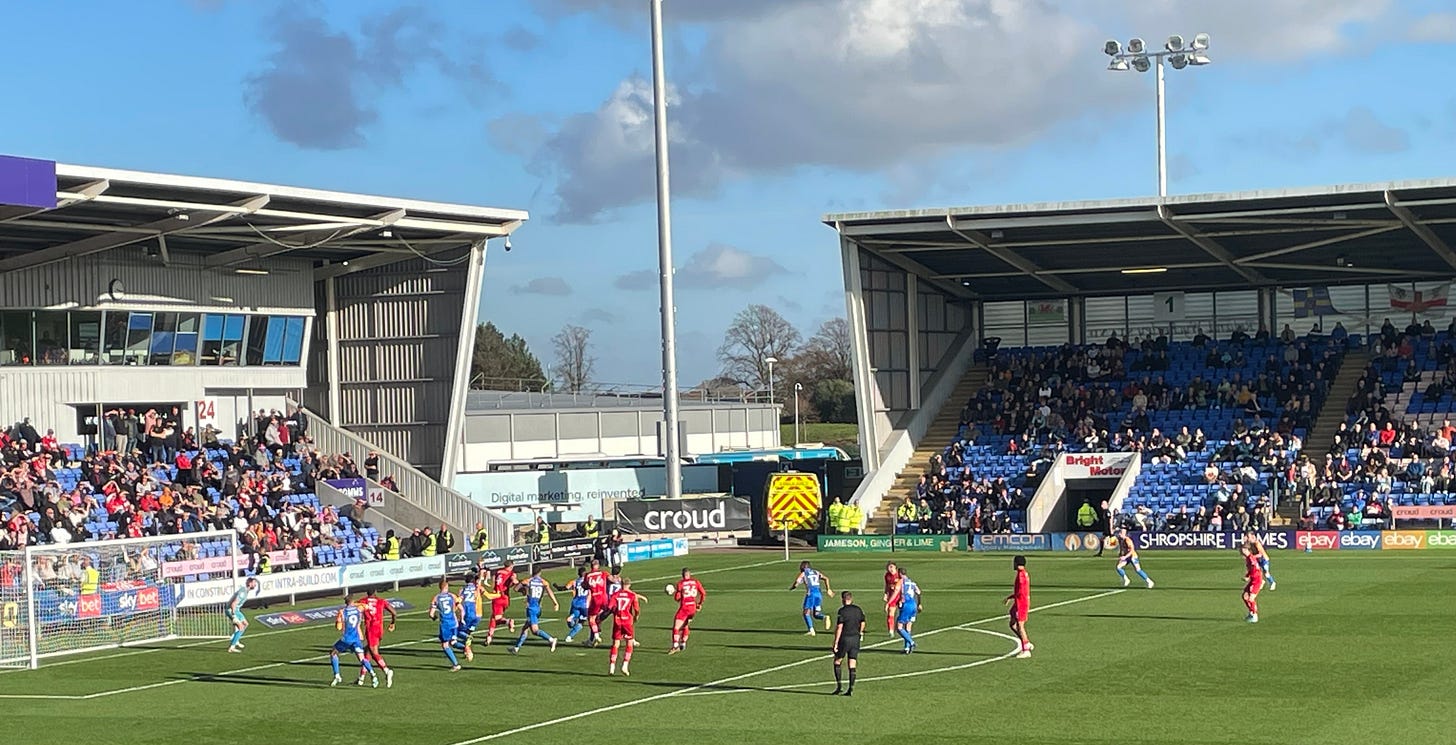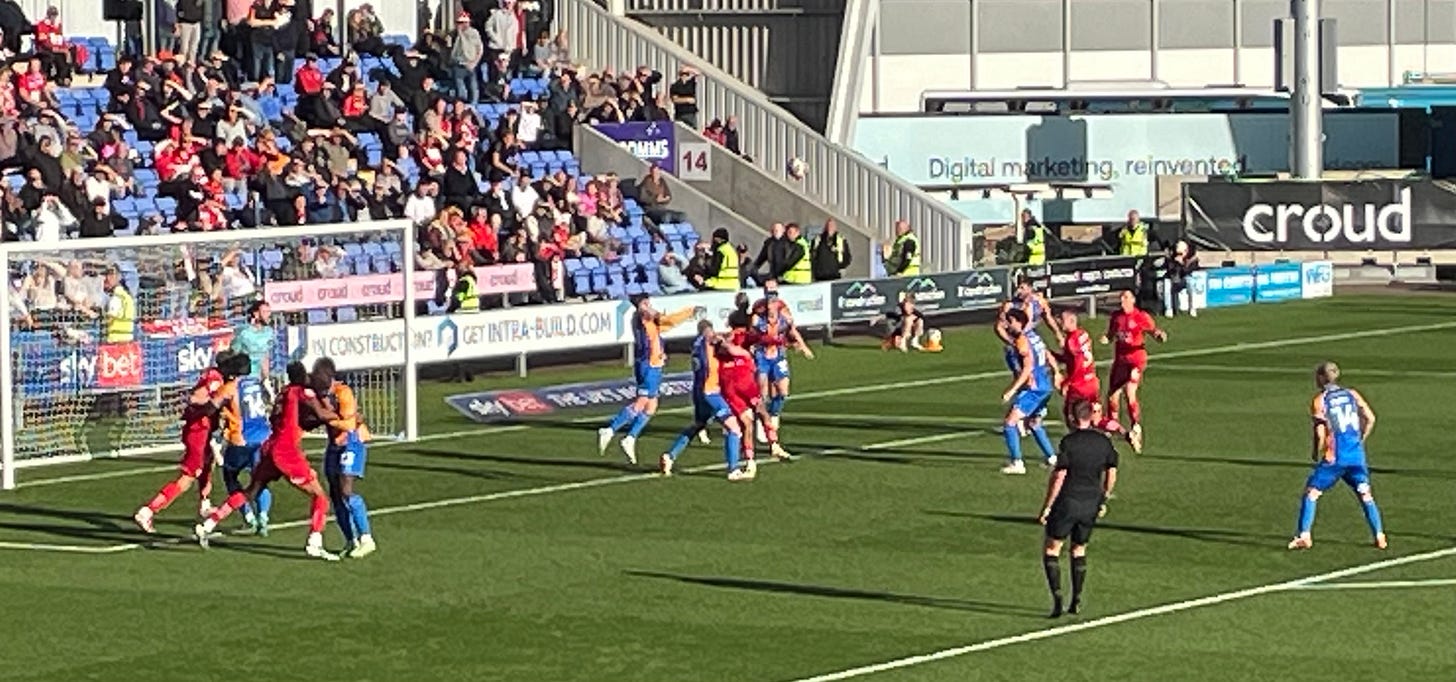Last week lawyers for Donald Trump’s election campaign wrote to the Federal Election Commission to complain about blatant foreign interference in the presidential election, orchestrated by the UK Labour party. This letter got considerably more attention than the one Shrewsbury Town sent to EFL Referees supremo, Mike Jones, suggesting that referee interference in recent league matches was costing the club dear. Mr Jones was good enough to reply that Salop had indeed had the rough end of a couple of decisions: a penalty should have been awarded in their favour against Exeter; the offside decision that expunged a goal at Bristol Rovers was incorrect.
Mr Jones may or may not have briefed the referee appointed for Salop’s game against Barnsley in advance of the match, but Mr Adam Herczeg would have been conscious of the pressures associated with officiating under a microscope. The first half of this match managed to throw up several pitfalls for him, mostly stemming from Salop and Barnsley players engaging in a game of ‘Twister’ on the not infrequent occasions when the visitors were awarded a corner kick. At one point Toto Nsiala looked to have wrestled an opponent to the ground, but Mr Herczeg waved away appeals for a penalty from Barnsley players, and indeed hundreds of Tyke supporters in the south stand. This was an official that was not going to dowse any fuel on a potential controversy.
When the fourth official held up his board to indicate that the lucky punters inside Croud Meadow would have an additional four minutes of the first half to enjoy, most Salop supporters would have breathed a little easier that, despite a disjointed performance, their team would get to half time on level terms. That was before the intervention of Mr Herzceg. With Salop defending their box, the ball seemed to go out for a goal kick. Mr Herzceg pointed to the corner flag. From the corner kick Salop managed to half clear the ball, only for it come straight back into the area where Jon Russell despatched it into the net.
This was a gutting conclusion to forty-five minutes of mediocrity from both sides. Before kick-off Paul Hurst had announced a team selection that would have perplexed even ‘Ludwig’, the fictional supreme problem solver played by David Mitchell in the current BBC TV series. In defence Josh Feeney had been sacrificed to allow the inclusion of Nsiala. Despite suffering a nasty cut at the Memorial Ground, George Nurse would start as the defensive left midfielder. In attack, Taylor Perry took Leo Castledine’s place behind the front two. Tom Bloxham was preferred to John Marquis as George Lloyd’s strike partner.
The limitations of his defensive players seem to have forced Salop’s head coach to turn away from his preferred back four to playing three central defenders. Over the last few matches Hurst has, like an engineer toiling away in the workshop, been trying to construct the most effective formation in midfield and attack that can be bolted onto a back three. Against Barnsley he appeared to be experimenting with a tactical formation that dispensed with any creativity in midfield.
It could be easily anticipated that playing without any creative players would lead to a performance devoid of creativity, and Salop duly obliged, with a first half of dogged defending and energetic attacking but little to link the two together other than intermittent punts forward. Barnsley, sensing Alex Gilliead’s fragility as a bulwark on the left side, targeted that flank and it seemed inevitable that they would score with from a cross from the left. If not, there was a strong possibility that some set-piece argy-bargy in the area would see them awarded a penalty. It was probably the opponents’ physical presence at set-pieces that influenced Hurst to recall Nsiala, although the head coach probably found this decision as easy as I do when given an invitation to pop down to the pub for a pint. As things developed the best laid plans are vulnerable to chance; after half an hour Aaron Pierre felt a tweak in his hamstring and had to be replaced by Josh Feeney.
Russel’s goal on the brink of half time at least prompted Salop to make their first assault on their target – a Bloxham shot that forced the Barnsley keeper into a sharp save. A corner result, but this was squandered by George Nurse’s feeble delivery in the vague direction of the edge of the area.
Anyone expecting Hurst to make proactive substitutions for the second half were predictably disappointed, whilst others hoping that Salop would not swiftly concede another goal were equally dismayed. An innocuous looking punt up their left flank saw Max Watters brush pass Morgan Feeney like he would walking up a train corridor, take possession and fire the ball past Toby Savin.
Now when Town go 1-0 down most supporters suspect that the game is over; when a second goal is conceded they know it is all over. The real problem, however, is that the players seem inclined to agree with them. 2-0 is not an impregnable lead when over half an hour remains; one deflected shot could ricochet into the net and completely change the balance of the game. Salop seem to visibly lack any conviction that they might even fluke a goal. The visiting supporters sensed this and started an early victory disco as if they were celebrating a Bank Holiday Saturday. The Barnsley team, by contrast, defaulted to a succession of gambits designed to burn away the remaining minutes. This seemed totally unnecessary as the Town players looked just as anxious to hear the final whistle.
On sixty minutes Hurst made his only roll of the dice, bringing on Castledine and Marquis for Perry and Jordan Rossiter. The success of these changes is reflected in the fact that the live text statistician was not troubled to record a single Salop attempt on target for the remainder of the match. The only Town players emerging from this match with any credit were probably Bloxham and the unused substitutes. When asked in his post-match interview whether he had considered bringing on Charles Saygoe Jnr and Tommi O’Reilly, Hurst gave a verbal shrug: it was not really their type of game. It is hard not to wonder whether the head coach is starting to think that League One is not their league. In this interview Hurst did suggest that a refereeing error to lead to Barnsley’s opening goal, although this could not excuse Salop’s limp performance.
With this game being the last played in this year’s British Summer Time, it is sobering to realise that since the clocks went back in March Salop have managed only one league victory at home. Supporters all have their own theories about how this situation has arisen and their own views on which individuals are responsible. For what it is worth, I am willing to suggest that no fingers of blame should be pointed at Mike Jones at the EFL. If it is possible to point at individual refereeing decisions that might have affected some matches, it is equally valid to state that such incidents are disproportionally consequential because Salop’s current team is not good enough to create many scoring opportunities and make too many defensive errors. It is fair to say that if Town are relegated this season, it will not be because of bad refereeing decisions. By the same token, if Kamala Harris becomes the 47th President of the United States, it will not be solely down to a couple of hundred Labour party activists crossing the Atlantic to work on her campaign.






